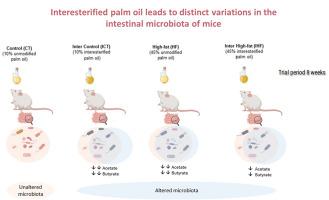Interesterified palm oil leads to distinct variation in the intestinal microbiota of mice
Abstract
Interesterified fat (IF) has been established as a substitute for trans-fat in ultra-processed foods. Preclinical studies have demonstrated that IF increases intestinal barrier permeability and bacterial translocation, but it is still unknown its impacts on the intestinal microbiota. Thus, this study aimed to evaluate if IF modulates the intestinal microbiota and the production of short-chain fatty acids (SCFAs) by the intestinal bacteria of male Swiss mice fed control or high-fat diet, with or without IF. Animals were divided into groups that received anormolipidic control diet (10% of calories from lipids) or high-fat diet (45% of calories from lipids) containing unmodified fat or IF, both obtained from palm oil: CT (Control diet); ICT (Interesterified Control diet); HF (High-fat diet); IHF (Interesterified High-fat diet) for eight weeks. Fecal samples were collected directly from the animals' colons for processing. The SCFA production was analyzed by gas chromatography. For microbiota diversity, bioinformatics analysis was carried out. Significant differences in microbiota composition at the phylum level were not observed between diet groups. However, a reduction in abundance of the Lactobacillus and Enterococcus genera, and an increase in the Peptococcus genus were found in high-fat diet groups. Interestingly, in the normolipid diet group with IF (ICT group), the animals showed microbiota composition similar to those found in animals that consumed high-fat diets. These alterations negatively interfered with the production of acetate and butyrate and may influence intestinal homeostasis and compromise metabolism. This study opens important discussions about the physiological impact of IF in health.


 求助内容:
求助内容: 应助结果提醒方式:
应助结果提醒方式:


